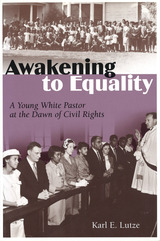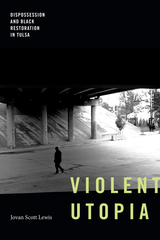2 books about Tulsa (Okla.)

Awakening to Equality
A Young White Pastor at the Dawn of Civil Rights
Karl E. Lutze
University of Missouri Press, 2006
When Karl Lutze arrived in Oklahoma in 1945, he stepped into another world. A newly ordained clergyman born in Wisconsin, he was a young white man assigned to minister among Muskogee’s African American community. He soon found that in the South, crosses were as likely to be burned as revered. His recollections of postwar Oklahoma provide a compelling testament to the era’s racial conflict and some steps taken toward its resolution.
Awakening to Equality offers a unique perspective on an often-violent era that witnessed the gradual dismantling of segregation. Serving congregations in Muskogee and Tulsa, Lutze encountered a cross section of both communities—from the white and black power brokers to the most disempowered black and biracial families—and a stratified society buttressed by intimidation, cross burnings, and bombs. His activism in the Urban League and other local civil rights organizations gave him firsthand experience with forces moving toward change, as well as with the more entrenched forces resisting it.
Blending personal anecdotes and recollections of key players in this unfolding drama, Lutze puts a human face on historical and journalistic accounts of social change during the crucial early years of the civil rights movement. He takes readers back to small-town and urban Oklahoma in a time when African Americans were beginning to challenge segregation in Muskogee’s public transportation and a handful of liberal whites were trying to move their communities toward desegregation. Throughout this rich memoir, we meet actual people creating a future—one that involved the very redefinition of America.
More than a view of an earnest young clergyman trying to grow beyond the racial and social limitations of the church of his day, Awakening to Equality also depicts the struggles of Lutze’s own denomination to overcome its earlier accommodation of racism. Lutze’s success in his ministries made his achievements a model for mission work among African Americans and led to his appointment in 1959 first as field secretary and then shortly thereafter as executive director of the Lutheran Human Relations Association, a pioneering civil rights organization. Simultaneously, he taught classes as Associate Professor of Theology at Valparaiso University.
Lutze not only witnessed important events but also participated in them and found that his entire career was shaped by the experience. Awakening to Equality is a moving story that captures the real-life education of a prominent clergyman during a critical period in American life.
[more]

Violent Utopia
Dispossession and Black Restoration in Tulsa
Jovan Scott Lewis
Duke University Press, 2022
In Violent Utopia Jovan Scott Lewis retells the history and afterlife of the 1921 Tulsa race massacre, from the post-Reconstruction migration of Black people to Oklahoma Indian Territory to contemporary efforts to rebuild Black prosperity. He focuses on how the massacre in Tulsa’s Greenwood neighborhood—colloquially known as Black Wall Street—curtailed the freedom built there. Rather than framing the massacre as a one-off event, Lewis places it in a larger historical and social context of widespread patterns of anti-Black racism, segregation, and dispossession in Tulsa and beyond. He shows how the processes that led to the massacre, subsequent urban renewal, and intergenerational poverty shored up by nonprofits constitute a form of continuous slow violence. Now, in their attempts to redevelop resources for self-determination, Black Tulsans must reconcile a double inheritance: the massacre’s violence and the historical freedom and prosperity that Greenwood represented. Their future is tied to their geography, which is the foundation from which they will repair and fulfill Greenwood’s promise.
[more]
READERS
Browse our collection.
PUBLISHERS
See BiblioVault's publisher services.
STUDENT SERVICES
Files for college accessibility offices.
UChicago Accessibility Resources
home | accessibility | search | about | contact us
BiblioVault ® 2001 - 2024
The University of Chicago Press









